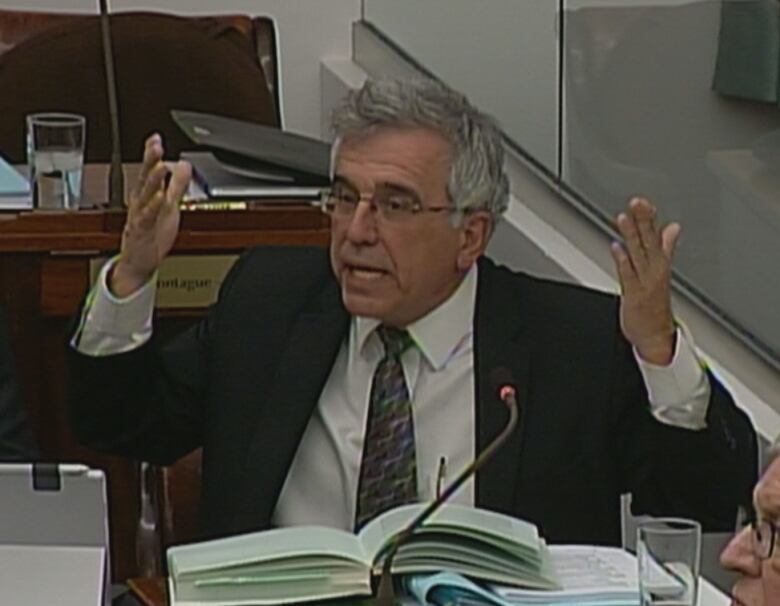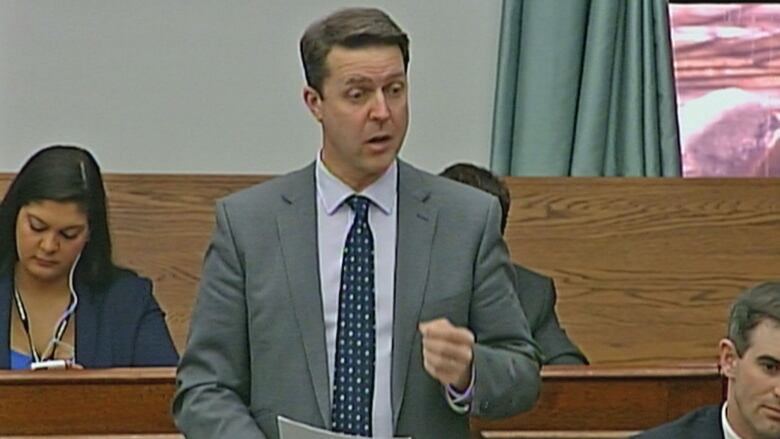Amalgamation early battleground in P.E.I. spring sitting
Both opposition parties push plebiscite plans; government vows to stay the course

"Will the minister of communities, land and environment admit that the process of rural amalgamation to date has been a failure?" Green MLA Hannah Bell asked Richard Brown during question period on Tues., Apr. 10.
It's the kind of question the Tories used to ask regularly during question period, although if their policies were in fact failing, Island cabinet ministers have shown themselves remarkably reluctant to admit that.
"Community groups have been engaged and Islanders have been engaged," Brown responded. "People within the community of the Three Rivers area wanted to make their place a better place for them, their families, their grandchildren and future generations. We owe it to that group that the process be followed."

The Green Party used all six of its questions that day to try to press home the same point: rural amalgamation has failed for lack of community buy-in; government should learn from this mistake.
Amalgamation a three-way battle
But for all the PC boxes that line of questioning ticks off (amalgamation has failed, government is failing), there was no thumping of desks from the PCs in support of the Greens, like there has been when independent MLA Bush Dumville stands to talk about his time as a Liberal.
Amalgamation has emerged early in this sitting as a three-way battle, and even though both opposition parties are bringing forward some of the same ideas, for now they seem to be fighting on different sides. With continued expectations for an early election, the battle lines are being fortified.

The Greens are asking for another plebiscite on Three Rivers before cabinet makes a final decision on whether to move forward. They're also asking government to create a citizen's group made up of rural residents to come up with a plan to change rural governance. On social media, the PCs accuse the Greens of flip-flopping on amalgamation, based on leader Peter Bevan-Baker's vote in favour of the Municipal Government Act.
Meanwhile, PC MLA Brad Trivers has introduced a private members bill to amend the act. Overall, Trivers' bill would give residents of unincorporated areas a larger role to play in the amalgamation process, requiring:
-
a petition with signatures from 30 per cent of all unincorporated residents who would become part of a new or expanded municipality before changes are considered;
-
IRAC hold a plebiscite before recommending to the minister whether an amalgamation should go forward;
-
IRAC's recommendation be tabled in the legislature for debate before cabinet makes its final decision.
But no matter which opposition party makes the recommendation, government seems unwilling to consider changes to the current amalgamation process.
Raucous debate
Debate over the bill on Thurs., Apr. 12, became at times raucous, with Brown transposing criticism of the amalgamation process onto the players in that process, including local representatives on the Three Rivers committee.

"So the people that came together … that put their name and time and efforts into this, you reject them. You reject all the work they did. You guys are sitting there and saying these guys did everything wrong."
"I can't believe the minister's over there trying to turn this into a pro- or against amalgamation debate," replied PC MLA Sidney MacEwen.
"If the minister would read the bill in front of him…" MacEwen said, unable to finish the thought as he was drowned out by the hubbub from both sides of the House.
'Give them a voice,' Tories say
When the noise died down, he posed a question to his colleague Trivers, the sponsor of the bill.
"Does your bill help those people that are in unincorporated areas, does it help them to incorporate? Does this process help them give them a voice?" MacEwen asked.
"I believe yes, this will help the incorporation process," Trivers replied, explaining his idea that a lack of process to engage unincorporated areas is a shortcoming in the current legislation.
Under the current legislation, a proposal to create a new municipality requires signatures from 30 per cent of unincorporated residents of the proposed new area only if those residents are the ones putting the proposal forward. No signatures are required if the proposal originates with the minister or with a neighbouring municipality.
Trivers said even if government were to reverse course and support his changes, it's too late to change the process for Three Rivers, which is expected to begin a formal 30-day consultation process shortly.

